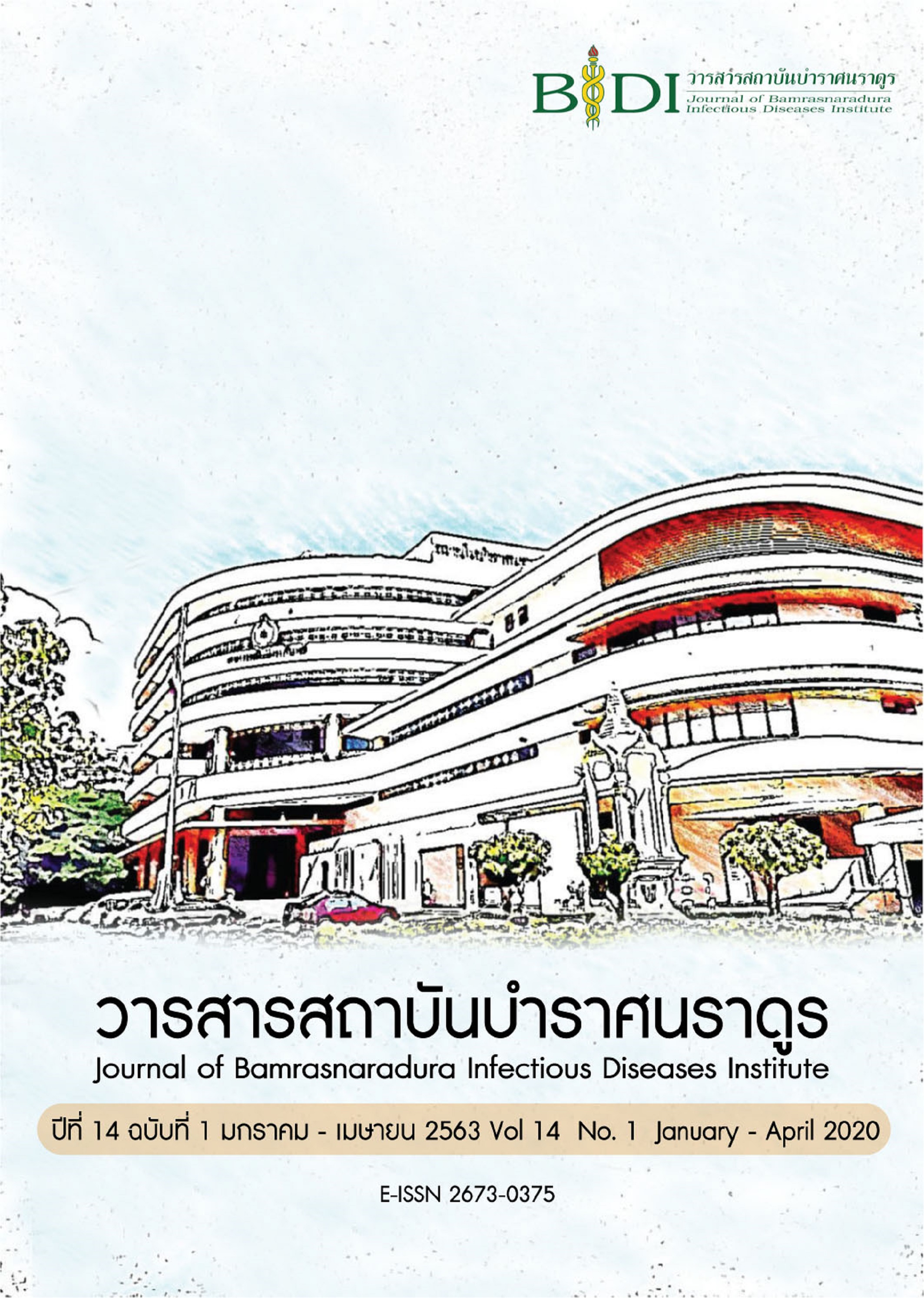ปัจจัยทำนายพัฒนาการด้านการคิดเชิงบริหารในเด็กวัยก่อนเรียน
Main Article Content
บทคัดย่อ
พัฒนาการด้านการคิดเชิงบริหารในเด็กวัยก่อนเรียน มีความสำคัญตั้งแต่วัยทารกแรกเกิดจนถึงวัยผู้ใหญ่ที่ส่งผลต่อความสำเร็จในชีวิต การวิจัยแบบหาความสัมพันธ์เชิงทำนายนี้ มีวัตถุประสงค์เพื่อศึกษาปัจจัยทำนายพัฒนาการด้านการคิดเชิงบริหารในเด็กวัยก่อนเรียน กลุ่มตัวอย่างคัดเลือกโดยการสุ่มแบบหลายขั้นตอน เป็นมารดาและเด็กวัยก่อนเรียน จำนวน 84 คน ที่มาเข้ารับบริการในศูนย์พัฒนาเด็กเล็กในเขตเทศบาลเมือง จังหวัดบุรีรัมย์ เก็บรวบรวมข้อมูลระหว่างเดือนกรกฎาคม - สิงหาคม พ.ศ. 2562 เครื่องมือที่ใช้ในการเก็บรวบรวมข้อมูลประกอบด้วย แบบสอบถามข้อมูลทั่วไป แบบสอบถามพื้นอารมณ์เด็กวัยก่อนเรียน แบบสอบถามความเครียดในการเป็นมารดา แบบสอบถามความสัมพันธ์ระหว่างมารดาและบุตร และแบบสอบถามการอบรมเลี้ยงดูบุตร มีค่าความเชื่อมั่นแอลฟาของครอนบาคเท่ากับ 0.72, 0.85, 0.91 และ 0.91 ตามลำดับ และแบบประเมินพัฒนาการด้านการคิดเชิงบริหารในเด็กวัยก่อนเรียนมีค่าความเท่าเทียมกันของการสังเกตเท่ากับ 0.87-1.00 วิเคราะห์ข้อมูลโดยใช้สถิติพรรณนา และการวิเคราะห์ถดถอยพหุคูณแบบขั้นตอน
ผลการศึกษาพบว่า ความสัมพันธ์ระหว่างมารดาและบุตรเป็นตัวทำนายที่ดีที่สุด (β = 0.674, p-value< 0.001) รองลงมาคือ ความเครียดในการเป็นมารดา (β = -0.203, p-value = 0.005) การอบรมเลี้ยงดูบุตรแบบประชาธิปไตย (β = 0.160, p-value = 0.024) และพื้นอารมณ์ของเด็กมีลักษณะเลี้ยงง่าย (β = 0.159, p-value = 0.031) โดยตัวแปรทั้งสี่สามารถร่วมกันทำนายพัฒนาการด้านการคิดเชิงบริหารในเด็กวัยก่อนเรียนได้ร้อยละ 62.2 (R2 = 0.622, F(4,79) = 32.437, p-value < 0.001) จากผลการศึกษาครั้งนี้ให้ข้อเสนอแนะว่า พยาบาลและบุคลากรด้านสุขภาพควรส่งเสริมความสัมพันธ์ระหว่างมารดาและบุตร การอบรมเลี้ยงดูบุตรที่เหมาะสม การจัดกิจกรรมเพื่อลดความเครียดของมารดา และส่งเสริมพื้นอารมณ์ของเด็กที่เหมาะสม เพื่อส่งผลให้เด็กวัยก่อนเรียนมีพัฒนาการด้านการคิดเชิงบริหารที่เหมาะสมมากขึ้น
Article Details
เอกสารอ้างอิง
Anderson P. Assessment and development of executive function (EF) during childhood. Child Neuropsychol 2002 Jun; 8(2): 71-82. doi: 10.1076/chin.8.2.71.8724 PMID: 12638061.
Diamond A. Executive functions. Annu rev psychol 2013; 64: 135-68. doi: 10.1146/annurev-psych-113011-143750. PMID: 23020641.
Tripathi S, Musikaphan W. Quality of children’s life 2013.Nakonpathom: Appa printing group; 2013. (in Thai)
Health Systems Research Institute, Mahidol University. Tool development and evaluation criteria for assessment of executive function in early childhood. Nakon Pathom: Mahidol University; 2014. (in Thai)
Narwold KM. Early childhood executive functions:Components, risk factors, and interventions [dissertation]. United States: The Honors College, Wesleyan University; 2016.
Bernier A, Beauchamp MH, Carlson SM, Lalonde G. A secure base from which to regulate: Attachment security in toddlerhood as a predictor of executivefunctioning at school entry. Dev Psychol 2015 Sep; 51(9): 1177-89. doi: 10.1037/dev00000320. PMID: 26192039.
Affrunti NW, Woodruff-Borden J. The associations of executive function and temperament in a model of risk for childhood anxiety. J Child Fam Stud 2013 Dec; 24(3): 715-24. doi: 10.1007/s10578-016-0623-x. PMID: 26754748.
Phinthong B, Chaimongkol N, Pongjaturawit Y. Family factors related to executive function development in preschool children. The Journalof Faculty of Nursing, Burapha University 2018; 26(2): 20-9. (in Thai)
Hackman DA, Gallop R, Evans GW, Farah MJ. Socioeconomic status and executive function: Developmental trajectories and mediation. Developmental sci Sep 2015; 18(5): 686-702. doi: 10.1111/desc.12246. PMID: 25659838.
Vernon-Feagans L, Willoughby M, Garrett-Peters P. Predictors of behavioral regulation in kindergarten: Household chaos, parenting, and early executive functions. Dev Psychol 2016 Mar; 52(3): 430-41. doi: 10.1037/dev0000087. PMID: 26751500.
Lengua LJ, Kiff C, Moran L, Zalewski M, Thompson S, Cortes R, et al. Parenting mediates the effects of income and cumulative risk on the development of effortful control. Soc Dev 2014 Dec 27; 23(3): 631-49. doi: 10.1111/sode.12071.
Sarsour K, Sheridan M, Jutte D, Nuru-Jeter A, Hinshaw S, Boyce WT. Family socioeconomic status and child executive functions: The roles of language, home environment, and single parenthood. J In Neuropsych Soc 2011 Jan; 17(1): 120-32. doi: 10.1017/S1355617710001335. PMID: 21073770.
Geers MCK. Temperament and executive function problems in preschoolers [dissertation]. Netherlands: Leiden University; 2013.
Brummelte S, Grunau RE, Synnes AR, Whitfield MF, Petrie-Thomas J. Declining cognitive development from 8 to 18 months in preterm children predicts persisting higher parenting stress. Early Hum Dev 2011 Apr; 87(4): 273-80. doi: 10.1016/j.earlhumdev.2011.01.030. PMID: 21334150.
De Cock ES, Henrichs J, Klimstra TA, Maas AJB, Vreeswijk CM, Meeus WH, et al. Longitudinal associations between parental bonding, parenting stress, and executive functioning in toddlerhood. J Child Fam Stud 2017 Feb 27; 26(6): 1723-33. doi: 10.1007/s10826-017-0679-7. PMID: 28572718.
Merz EC, Landry SH, Zucker TA, Barnes MA, Assel M, Taylor HB, et al. Parenting predictors of delay inhibition in socioeconomically disadvantaged preschoolers. Infant Child Dev 2016 Sep-Oct; 25(5): 371-90. doi: 10.1002/icd.1946. PMID: 27833461.
Cohen J. A power primer. Psychol Bulletin 1992 Jul; 112(1): 155-9. doi: 10.1037//0033-2909.112.1.155. PMID: 19565683.
Kraybill JH, Bell MA. Infancy predictors of preschool and post-kindergarten executive function. Dev Psychol 2013 Jul; 55(5): 530-8. doi: 10.1002/dev.21057. PMID: 22692790.
Matte-Gagné C, Bernier A, Sirois MS, Lalonde G,Hertz S. Attachment security and developmental patterns of growth in executive functioning during early elementary school. Child Dev 2017 May; 89(3): 167-82. doi: 10.1111/cdev.12807. PMID: 28556965.
Wagner SL, Cepeda I, Krieger D, Maggi S, D’Angiulli A, Weinberg J, et al. Higher cortisol is associated with poorer executive functioning in preschool children: The role of parenting stress, parent coping and quality of daycare. Child Neuropsychol 2016; 22(7): 853-69. doi: 10.1080/09297049.2015.1080232. PMID: 26335047.
Juthaphakdeekul N, Thanasetkorn P, Lertawasdatrakul O. Tool development and evaluation criteria for assessment of executive function in early childhood. Nakon Pathom: Institute of Molecular Bioscience, Research Center for Neuroscience, Mahidol University; 2017. (in Thai)
Mackey AP, Raizada RD, Bunge SA. Environmental influences on prefrontal development. Principles of Frontal Loba Function 2013 Feb. doi: 10.1093/med/9780199837755.003.0013.
Lucassen N, Kok R, Bakermans-Kranenburg MJ, Van Ijzendoorn MH, Jaddoe VWV, Hofman A, et al. Executive functions in early childhood: The role of maternal and paternal parenting practices. Brit J Dev Psychol 2015 Nov; 33(4): 489-505. doi: 10.1111/bjdp.12112. PMID: 26359942.
Shields GS, Sazma MA, Yonelinas AP. The effects of acute stress on core executive functions: A meta-analysis and comparison with cortisol. Neurosci Biobehav R 2016 Jun 28; 68: 651-68. doi: 10.1016/j.neubiorev.2016.06.038. PMID: 27371161.
Noel M, Peterson C, Jesso B. The relationship of parenting stress and child temperament to languagedevelopment among economically disadvantaged preschoolers. J Child Lang 2008 Nov; 35(4): 823-43. doi: 10.1017/S0305000908008805. PMID: 18838014.
Sangsai N, Chaimongkol N, Phaktoop M. Predictorsof adaptive behavior of preschoolers receiving service in child daycare center. The Journal of Faculty of Nursing, Burapha University 2011; 19(2): 97-109. (in Thai)
Kraikul S, Chaimongkol N, Phaktoop M. Alternative: Relationships between parental stress and parent-child attachment in sick children who admitted in intensive care unit (ICU). The journal of Boromarajonani College of Nursing, Chonburi 2010; 22(1): 19-28. (in Thai)
Chivanon N, Phaktoop M. Factors influencing separation anxiety of pre-school children as perceived by mothers in child care center, Chonburi Province. Nursing Journal of The Ministry of Public Health 2016; 26(1): 161-75. (in Thai)
Pinkaew P. A study of the relationship between child rearing and the creative thinking of pre-school children [dissertation]. Bangkok: Ramkhamhaeng University; 2009. (in Thai)


